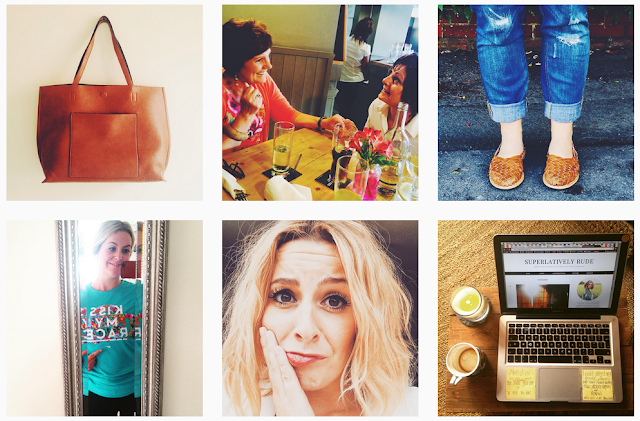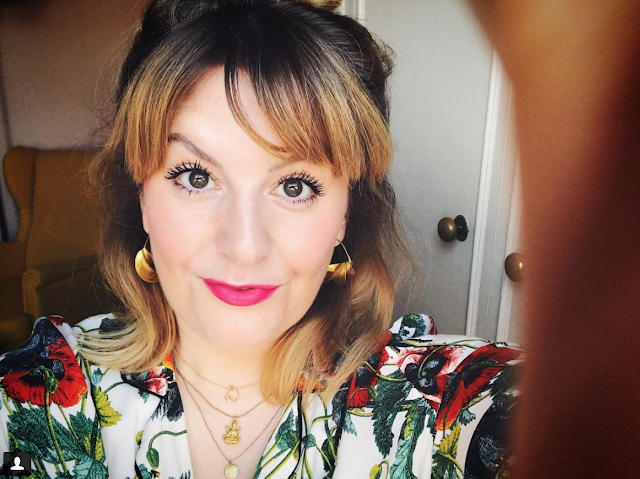Insta-Shaming
It’s impossible to ignore a rapidly
increasing trend for Insta-shaming snowballing across websites and print
publications right now.
This past week alone I’ve read five articles - and angrily
skipped over countless others - on how we’re all psychopathically curating an online
show reel of Pinterest-styled, vacation-going, prosecco-cocktail-drinking and brunch-eating
lives that conveniently leave out the acne break-out, relationship arguments and
overdue rent check parts of our lives. We’re presenting all sparkle and no
struggle, we’re told, and so shame on us for lying to the wider world that way.
We’re monsters. Ego-fuelled Frankensteins building “online brands” based on
flagrant self-promotion, and we’re doing it because everyone else is. Oh, and
we’re collectively miserable because of it.
On the flipside, this past week I have happily
photographed and edited three parts of my life – a new pair of shoes, a
particularly good eyeliner day, and a dad/daughter trip – that I later felt
shamed out of sharing on Instagram because those moments were, somehow, too positive.
I find myself on a version of the Internet where
I feel constantly policed.
Wanna know something insane?
I feel, with increasing voracity, that I am "not allowed" to be overly excited on social media because nobody can possibly be that happy always and so what isn't she telling us? It's bumming me out.
New social media etiquette dictates that I can post a sunbathing-in-the-garden shot as long as I point out I got up at 6 a.m. to hit a deadline first, or I’m
able to celebrate a superb hair day if I mention I’m tipping my head that way
to hide a particularly bad zit. I’m supposed to have my followers in mind at
all times, never letting a “just because” celebratory image slip through the cracks, lest I
give the wrong impression of how easy and/or struggle-fuelled my
days are. "Life is hard, and don't ever forget it" is the new enforced point-of-reference in our social contracts.
It’s my job, as the “poster” to Keep It Real, or else I’m as bad as
the rest of them. "Them" being... well. I'm not quite sure who. Self-depreciation is to come as standard, whether that
self-depreciation comes naturally or not. It's just not on to be enthusiastic about the everyday. Making Other People Feel Inadequate
is a capital-letters offence, now, even when wholeheartedly unintentional - and I don't know a single person who has ever posted anything with the intention of upsetting others.
Honesty
is, I think, to be hopefully expected (and I love the brilliant #TotalHonestyTuesday tag)
but the trend for actively Insta-shaming others is yet another way we keep each other small, over building each other up. My argument is: why shouldn’t I be allowed
to curate my own “online brand” brimming with "I love my life"? Your vibe attracts your tribe, man, and if you don't like it - don't follow it. What irritates me about these articles is an
element of their own hypocritical irresponsibility. Irresponsibility in that there’s seldom an accompanying guide on how to responsibly consume social media.
The Rules:
Social code says it’s unfathomably bad form
that a user - be them high-profile blogger or us mere mortals - continues posting carefree #OOTD posts without disclosing her
bad case of thrush or impending divorce, say. We’ve become Perfection Detectives,
taking it upon ourselves to track down yet another (perceived) distorted
reality of somebody we might or might not personally know to prove that we understand nobody
is that flawless. There’s a social media witch hunt where the onus is firmly on
the content producer and not the content consumer - a bit like how we all slag
off the Mail Online but click through on the side bar of shame anyway, all the
while tutting that such a trashy website exists.
Can't we all just agree that we understand Instagram is a highlight reel of otherwise imperfect lives, and move on?
I think as “Generation Guinea Pig” we - “millennials” - will spend our lives trying to pin down exactly
how to healthily use the Internet in a way our kids (and definitely their kids) won’t need to. There’ll be
classes as part of social studies and citizenship in high school, if there
aren’t already, training pupils on responsible Internet consumption. We’re
still learning that we get to choose what we’re exposed to, to as large a
degree as possible. We don’t *have* to keep scrolling on her impossibly shiny
hair, their wildly adorable kids, or his ripped abs and penchant for subtle
product placement if seeing that doesn't make us feel good.
Because that's it: we don't have to follow anyone. There’s no gun to our head (but if there was, you bet your ass that I’d know
just the right filter to make it look artistic-chic). I’ve un-followed relatively
close friends and strangers alike for a variety of misdemeanours that say far more
about me than them.
My reasons for un-following even the loveliest of people
include, but are not limited to: too many on fleek selfies (I get envious that
I don’t look like that), a loving boyfriend (I am single, and get jealous that
I do not have that), an active social life (why aren’t I invited to that many
openings and award shows?) and travel photos with no captions – or worse, a
non-ironic “It’s okay here” caption – because don’t you ever have to work? I’ve
un-followed because they lost weight and look great and I can’t do that yoga
pose, because I simply do not believe their home is always that tidy, because I
can find my own Descartes quote to accompany a pink-skied sunset. I’ve
un-followed fellow writers who have success I want, even.
The thing all of those reasons have in
common is that it is on me. It’s my
insecurities, my jealousies, my envious tendencies. And that seems to be the
piece of the puzzle missing from the dialogue almost everywhere. That it's on us to follow only what makes us feel good.
I actively curate a list of people and
companies to follow that inspire me and edit it frequently. Personally, I
prefer a story with the image, and so that’s what I tend to post as much as
follow: snaps of a particular moment in time, with a prose underneath
explaining why the poster finds it
special. Stuff that makes me think, stop, admire, reflect. Storytelling. Life is indeed hard, and so I pick pretty over pithy, witty
over shitty. Your criteria will undoubtedly different, as it should be. That's the excitement of individuality.
The clue is in the name with social media –
it is designed to be inherently social. So, whilst we don’t keep IRL company with
bores who don’t add value to our lives, why are we doing it with our online selves?
An important rule of thumb is surely that if you don’t want to celebrate as
much as commiserate the person you’re following, don’t follow them. Related: hate-following baffles me.
I just want to raise a hand to say, in a
voice with as much conviction as I can muster, and in the full knowledge of my
own online imperfections, that humans are selfish and self-centered: we’re all
looking for pieces of ourselves in other people’s stories. So, if we're following somebody else’s story and don’t like what we see, it’s probably the
pieces of ourselves we need to take a better look at. Life's too short to not hit unfollow and move on - and not to take responsibility for ourselves, too. Life is definitely too short for that.
----------
Want to say something about this post? Talk to me!
I have an email club I want to invite you to, because you're special and I'm looking 4 ways 2 talk witchu more. Sign up here and enable me in my crush. Go on.



Comments
Post a Comment